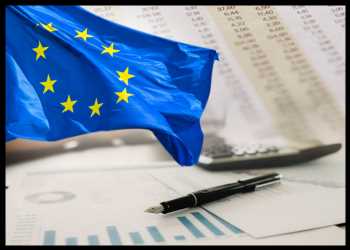Adding to concerns over growth prospects, euro area economic sentiment deteriorated to the lowest in six months in May reflecting lower confidence in industry, services and retail trade.
The economic sentiment index fell to 96.5 from 99.0 in April, survey results from the European Commission showed Tuesday. This was the lowest reading since November and also below economists’ forecast of 98.9.
The overall fall in the economic confidence was due to the deterioration in confidence in industry, construction, services and, particularly, retail trade. Meanwhile, the consumer confidence continued to recover, albeit at a slower pace.
The industrial confidence index declined to -5.2 from -2.8 a month ago. This was the fourth consecutive fall and the index hit the lowest since November 2020.
The deterioration in managers’ production expectations and their assessments of the current level of overall order books contributed to the decline. The stocks of finished products were increasingly assessed as too large.
The services sentiment indicator slid to 7.0 from 9.9, while the score was forecast to improve 10.2. The weakness reflects less upbeat views on both past and expected demand and also their assessment of the past business situation.
By contrast, the consumer confidence index rose slightly to -17.4 in May from -17.5 in the previous month. The score came in line with the flash estimate.
The mild improvement in consumer sentiment was driven by consumers’ improved appraisals of their households’ past and future financial situation, as well as the expected general economic situation.
Meanwhile, the retail trade confidence registered a sharp drop as managers’ assessment of their expected and past business situation declined and stocks were assessed to be too large or above normal. The corresponding index plunged to -5.3 from -0.9.
At 0.2, the construction confidence index dropped from 0.9 points a month ago. The index continued to move sideways as managers’ assessment of order books edged up slightly, while employment expectations were down marginally.
The currency bloc likely registered a negative growth over the winter, ING economist Bert Colijn said. The survey unfortunately does not suggest that a vibrant recovery is underway, the economist observed.
Weak growth and a falling inflation outlook both add to expectations the peak in the interest rates is getting near, Colijn added.
The survey showed that selling price expectations dropped further in industry, services, retail trade and, to a lesser extent, in construction.
The employment expectations indicator fell to 104.7 in May from 107.5 in the previous month. The score eased due to less optimistic employment plans among services and industry managers.
Source: Read Full Article
-
YouTube Returns To Mid-May TV Upfronts Slot In New York With Annual Brandcast Event For Advertisers
-
European Shares Seen Opening Steady Ahead Of Powell Testimony
-
After a solid Q1, IndiGo’s troubles may mount in Q2FY24, warn analysts
-
Biden Administration Announces New Actions To End Cancer In US
-
NCDEX all set to relaunch groundnut futures after more than 13 years

